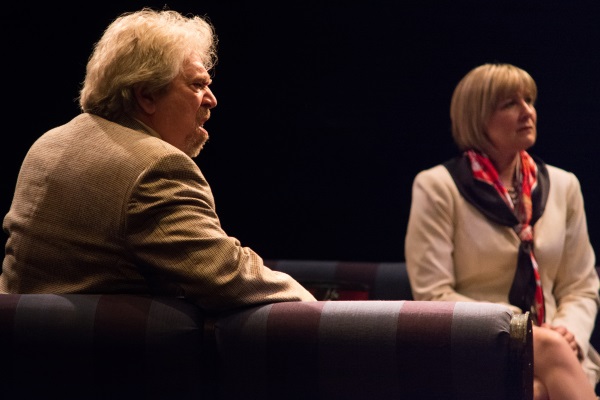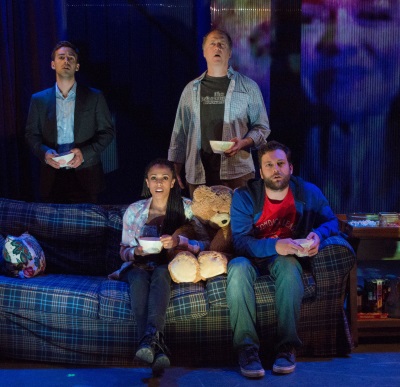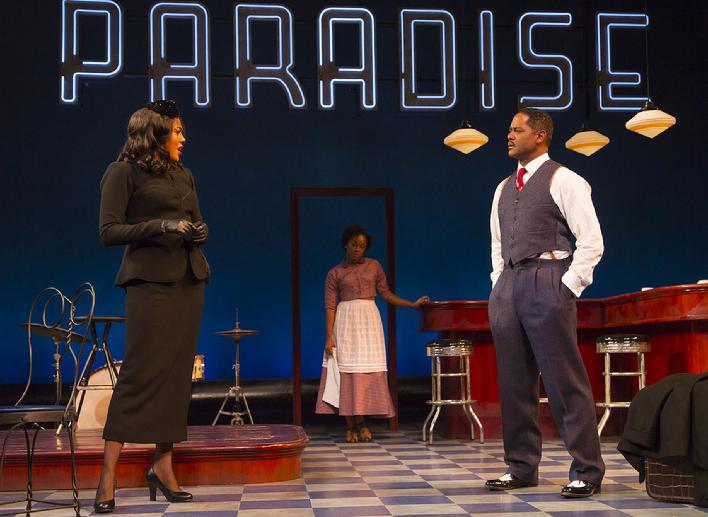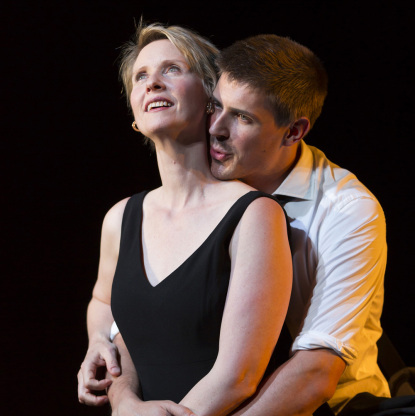Four plays I saw last week at Berkshire theater companies demonstrate the variety and versatility of the region’s summer stages: a musical born of adolescent angst; a period piece with – a rarity in any season – an all-African-American cast; a glossy drama about obsessive passion and power dynamics; and a conversation between two people who exchange only a few words.
They’re all interesting scripts with intriguing premises, given strong productions with impressive performances. All are new works, two of them American or world premieres. And three of the four share one failing of many new plays: They don’t know how to end.
What if a young man whose mother has just died found a stash of notes written to her by an unknown lover? That’s the premise of A Little More Alive, the pocket musical playing at Barrington Stage Company through August 8th.
Nate is a 29-year-old slacker (a surly, sarcastic Van Hughes) living in the basement of his parents’ suburban ranch and getting stoned at his mother’s funeral. His younger brother Jeremy (Michael Tacconi, exasperated and ironic) has a suit and a responsible job in the city, but he lets himself get sucked into his brother’s plan to track down the mysterious paramour. They’re joined by Lizzie (the incandescent Nicolette Robinson), their mother’s hospice caretaker, has bonded with the family and is still living there. Meanwhile, Dad (Daniel Jenkins, nicely fuzzy) is lost in happy-family memories, replaying VCR home movies, which we see projected on the back of Kris Stone’s sliding-panel set.
Nick Blaemire’s score shows equal influences of William Finn, whose Musical Theatre Lab is based at BSC, and Billie Joe Armstrong (Hughes is a veteran of American Idiot), with some thrilling vocal harmonies and dramatic counterpoints. Vadim Feichtner leads a tight five-piece backstage band that sometimes threatens to overpower the singers.
Blaemire’s script (he wrote that, too) presents interesting, edgy relationships but wastes the potential of his premise. A showstopping number in the climactic scene, performed by an effervescent Emily Walton, can’t keep the piece from fizzling. Walton’s character appears from nowhere and disappears just as suddenly, after supplying the last piece of the puzzle, which by then is unsurprising. Two more plot threads are, respectively, left hanging and perfunctorily resolved.
What if a burning obsession consumed a person so completely that it crippled judgment and threatened the very sense of self? That premise, surprisingly, can be applied to both plays I saw at the Williamstown Theatre Festival last week. Otherwise, though, they couldn’t be more different in style, mood, subject and setting. Paradise Blue takes place in a black jazz club in 1949 Detroit, while Kinship revolves around a big-city newspaper and a church-basement theater on the present-day West Coast.
Blue is the owner and horn-playing headliner of the Paradise, a jazz joint in Motor City’s Black Bottom, a district of autonomous African-American-owned enterprises where, as one jazzman puts it, “I can be a percussionist before being colored.” Blue is haunted by the memory of his father, a trumpet player who reached musical heights that make Blue blue. A cool, cruel dude, peremptory with his house band, abusive to his girlfriend, he’s planning to sell the club out from under their roots and livelihoods. When glamorous, hip-swinging Silver shows up with plans of her own, Blue is almost violently suspicious.
Dominique Morisseau’s play captures a turning point in African-American life in the way August Wilson’s Century Cycle did. In this postwar era, bebop is shouldering swing aside even as “urban renewal” (aka “slum removal”) is poised to destroy the neighborhood and its culture. She has a great ear for vernacular dialogue, though it gets a bit overwrought toward the end, and she’s well served by a pitch-perfect cast: Blair Underwood, almost frightening in his furious tortured intensity as Blue; Kristolyn Lloyd, winningly naïve as Pumpkin, Blue’s over-accommodating girlfriend-slash-housekeeper-slash-scullery-maid; Andre Holland, wiry and explosive as P-Sam the drummer; Keith Randolph Smith, laconically hefty as Corn the piano player/ivory-tickler; and De’Adre Aziza, sinuous and majestic as the mysterious Silver.
The script is staged by Ruben Santiago-Hudson with a fine sense of narrative flow and visual dynamics, achieving a rich texture and tense momentum until halfway through the second act, when it goes off the rails. A climactic event is so broadly telegraphed that when it arrives we go, “Oh,” and a key character’s trajectory is dropped so suddenly and completely that it’s pushed literally into the shadows of Neil Patel’s set.
Kinship, which I didn’t catch till just before it closed its brief run, involves a disjointed triangle. At two points are She and He (no names), each of them connected to point 3, who is his mother and her deceased mother’s best friend. Part of Carey Perloff’s play turns on each point of the triangle not knowing of the others’ connection, and part of it turns on a classical French tragedy.
She is a powerful woman, editor of a large newspaper, happily married with two kids. He is a younger man, single, a newly hired cub reporter trying his hand at journalism after tiring of TV-land. They meet, they flirt, they fall – well, not in love, but into a sort of fantasy lust which, for She at least, becomes obsessive. Her fixation echoes Racine’s Phèdre, which a fringe theater group is performing in a dingy part of town that’s ripe for a renaissance. He suggests an article about that and She instantly assigns him a series on it, despite his inexperience – prompting the question that, for emphasis, is posed twice in the play: Is she attracted to him because she thinks he’s got talent, or vice versa?
The characters don’t have names because, of course, they’re archetypes, like Phaedra and Hippolytus (except Perloff’s parallel to the myth is bloodless, in both senses). And because it’s metaphor, the playwright apparently feels no obligation to justify their suddenly operatic dialogue (“You are my addiction, my daylight”) or to give dramatic shape to their skyrocketing romance – depending instead on the triangle’s tension of mutual ignorance – or, for that matter, to give them a realistic relationships to their jobs.
Perloff knows from theater – she’s artistic director of San Francisco’s American Conservatory Theatre – and the play’s theater lore rings true, from the adventurous little troupe at the mercy of their landlord, a local church, to the faded career and old showmances of Mother/Friend. But she doesn’t know from journalism. The character He has been hired by the paper despite having no experience or proven ability. The newspaper shop talk sounds like peppy dialogue from a 1940s movie. And a major plot point is allowed to violate a cardinal rule of professional journalism.
Jo Bonney, admired as a director of experimental theater, gave this problematic play a tight, deft production, finding a nimble rhythm in the flow of short scenes across Rachel Hauck’s spare set. I wasn’t entirely convinced by Penny Fuller’s Mother/Friend, her performance a bit actressy even for a character who’s a former actress. Chris Lowell made a credible He within his rather incredible role, balancing a sexy charm with youthful naïveté. As She, Cynthia Nixon, a very busy theater actor who’s most widely known for her TV role as the cynical careerist Miranda in Sex and the City, was effectively caustic and careerist and suddenly impassioned. But I have to admit to an inward groan when Mother/Friend described the Phèdre performance as “very sexy” and Nixon/She replied, “I’m too old for sexy” with a knowing smirk toward the audience.
In the Kinship program, there’s a sidebar titled “Gender and the American Theatre Today,” in which Perloff, Bonney and WTF’s new artistic director, Mandy Greenfield, acknowledge “some momentum” in the push for gender parity in the theater (see also The Rohmann Ratio). But the three women also point to the fact that “most theatre seasons feature only 20% of work authored by women” and to the continuing bias toward established male playwrights that keeps female playwrights from becoming established. “We will know that we’ve arrived,” Perloff comments, when plays by women are considered “just as universal as any other stories.”
Finally, what if a woman on a train journey, reading the latest novel by her favorite author, finds herself sitting opposite him in the compartment? You might expect that premise to yield a probing, scintillating and/or amusing conversation, in which foibles are bared, life stories told and secrets revealed, with perhaps a suggestion of romance. And you’d be right on all counts, except one.
In The Unexpected Man, that dialogue takes place mostly in silence. That is, instead of listening in on two people conversing, we’re eavesdropping most of the time on what they are saying to themselves, inside their heads. Yasmina Reza’s play, in repertory through September 6th at Shakespeare & Company, is the smallest, most unassuming and most satisfying of this week’s quartet – not least because it knows exactly how to end.
You might also expect 90 minutes of two people who remain seated and talk mostly to themselves to wear thin. But Reza, author of Art and God of Carnage, is a past master of small moments that bristle with wit and intelligence. She’s aided, as usual, by Christopher Hampton’s supple translation (Reza is French, and the play takes place on the Paris–Frankfurt express).
They are called simply Man and Woman in the program, but the script gives them names. Their individual streams of consciousness, heard in alternating fragments and gradually converging, speak to the regrets and disappointments of two aging people. Despite his well-earned renown, Paul Parsky is bitter – that word is his mantra. He lingers morosely on less-than-appreciative friends, critics and relatives, on his chronic insomnia, on dissatisfaction with his own work, which he views as “a mishmash of approximations.”
Martha, his thoughtful and well-read fan, is hesitant to speak to him, not just because she’s in awe of his talent, but out of fear he won’t live up to her carefully cultivated image. Desire, she says (that is, thinks) is “so much bigger than what actually happens.” She, too, mulls disappointments and losses, especially the death of a dear friend and almost-lover.
The performers, Corinna May and John Woodson, are wonderful. Woodson is gruff and tetchy, uncomfortable in his own skin, while May is composed and thoughtful, poised even while agonized with indecision. We learn almost as much about the characters from their respective “neutral” poses while the other is speaking as from their interior monologues – Woodson slumped in a pissed-off glower, May looking up and out in wistful soft-focus with a hint of desperation.
They sit opposite each other on railway-carriage pews which slowly rotate on a wide turntable – designer John McDermott’s rewarding solution to the sightline problem of an otherwise static scene on a thrust stage. It’s also conceptually satisfying, as we see, from all sides, what they’re turning over in their minds.
I found myself less engaged by the characters’ separate biographies than by their silent awareness of each other (he likewise ponders addressing the attractive woman across the carriage). These are the moments that hold the play’s dramatic tension, leading tantalizingly up to the moment when they do, finally, converse. The ending is subtly seeded early on, and when it comes it’s both unexpected and completely right.
Williamstown photos by T. Charles Erickson; Shakespeare & Co. by Enrico Spada.
If you’d like to be notified of future posts, email StageStruck@crocker.com






